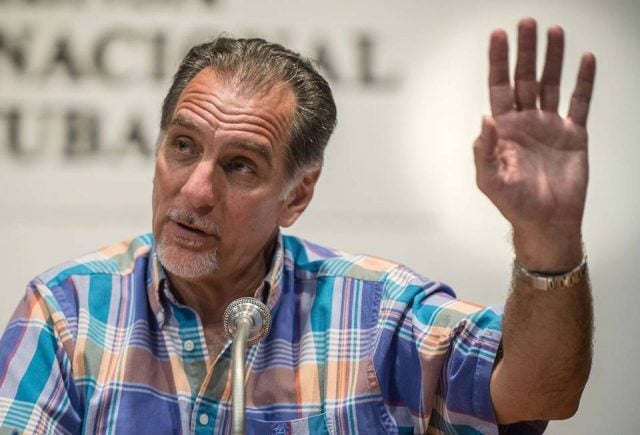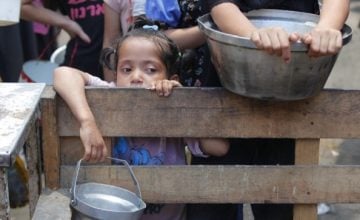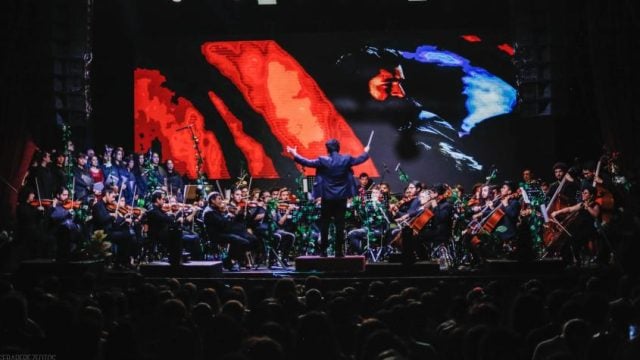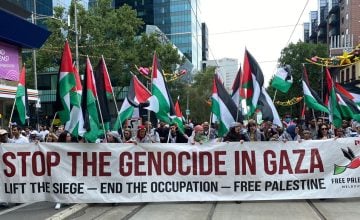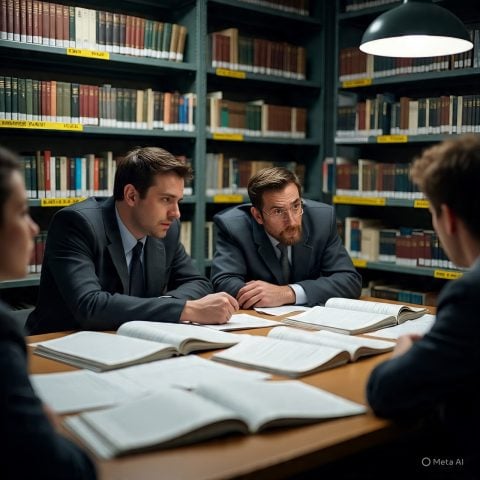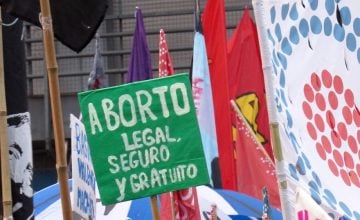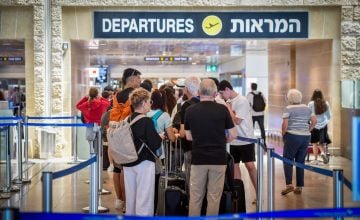René González, one of the five Cuban heroes and former political prisoner of the United States, warns that the policy of the White House will be to promote events such as those that occurred on Sunday, July 11, when a series of demonstrations took place, fueled, in part, by a campaign on social networks and media.
«Beyond the legitimacy of the claims of some people, all this is part of an attack against Cuba», he said.
In an interview with Voces sin Fronteras, hosted by Denis Rogatyuk, González stressed that the blockade has been a brutal act of war that has been strengthened, over the last four years. «The assault on the Cuban economy that the US government has implemented in these years has been brutal», he said.
By Denis Rogatyuk
DR: On the issue of the protests, how has your personal experience been in recent days? What have you seen on the streets of Havana or other cities?
RG: Like any citizen or like the vast majority of citizens of Cuba, I woke up last Sunday (July 11), and began to lead my normal life, Sunday life under the pandemic, which is not very normal, and suddenly the information began to appear on social networks. First, about what was happening in San Antonio, then the presence of the president there, and little by little they began to appear, especially from sites in Miami, information and jubilant videos about the events that were taking place in other parts of the country.
I continued doing my activities at home, until I realized a little later that it was something more serious. There, I connected with some colleagues. I started making some calls to see what was happening, and already in the afternoon, late at night, I went to two places where protests had taken place. I went to Diez de Octubre, when I got there, the protest was still present but it was practically ending. You could see the damage, the results of the confrontations of some violent people with the authorities, and then I went to Zanja Street where something had also happened, but to a much lesser extent, and that was where I began to observe, first-hand, what had happened.
Then, the information began to reach me. I think that on Monday there was still some other protest, and above all a mixture of falsehoods, many falsehoods, many lies, many videos. We all know now that even images of Buenos Aires, Alexandria, Venezuela, and other places were used to create the impression that Cuba was submerged in chaos, and that finally, the Cuban government had collapsed.
Everyone knows that this is a lie. In Cuba, of course, those of us who are here always knew it, but I suppose that it will have had its effect on some people who live outside of Cuba, who do not know the Cuban reality. And I also suppose that, above all, some exaggerations in relation to the supposed repression of peaceful protesters will have made their dent in some people who are not well informed.
DR: How has the whole process been of the counter mobilizations to support the process of the Revolution in Cuba?
RG: I am not going to deny that what happened on Sunday surprised us. We are not used to seeing events like these in our country, above all, we are not used to seeing that level of violence. I am going to clarify that not everyone who spoke out was a violent person, I believe that there were places, where some dissatisfied people came out, some even with genuine claims and concerns that have been imposed on us for years, to a great extent, from the United States, but the level of violence that took place on Sunday is rare. It is not customary in Cuba.
I think that it is something that we, of course, have to look into, make the corresponding analyzes, and take the social and political measures, and also in terms of the public order that must be taken. This, of course, provoked the rejection of people who are not used to it, who do not want it, who do not want to see our country like this. The demonstrations that have been organized by the communities, work centers, unions, in short, anyone who has been able to demonstrate, has gone out on to the streets to show that we want to build a peaceful country. We do not want those levels of violence on the street. And also to show that there is a majority of the Cuban people who continue to support this country, the revolution, the Government and that we are, above all, aware that beyond the legitimacy of the claims of some people, all this is part of an attack against the country. It is part of another episode that was well planned, through the use of social networks. But we are going to defend this Government, our sovereignty, our independence and we are going to continue resisting.
I think that if the people who came to demonstrate have something in common, it is that they surrendered, that is the truth, and I do not take this as an offense. I do not believe that everyone necessarily has to have the same level of endurance. We are, as a country, as a people, as a community, as a population, subjected to a genocidal policy of sixty years, whose express purpose, written by those who designed it, is precisely to make people surrender out of hunger, out of desperation, out of necessities, and well, there are people who surrender.
Among those people who decide to give in, who decide to blame the Cuban government for all this, there are people who are not criminals, and I believe that the criminal elements spurred on by the tremendous campaign on social networks made those demonstrations what we have seen these days, and I believe that we have the right, as the part of the population that has not surrendered and that maintains a dignified position in the face of this criminal, genocidal policy of the US imperialism, to take to the streets to demonstrate in favor of this process and against the policy that has tried to suffocate us for sixty years.
DR: There are many comparisons between those protests now and those of 1994, the so-called «El Maleconazo». What do you think about these comparisons?
RG: There are many points of contact, the main one, the common thread of both situations, the ‘backdrop’, is the US blockade against Cuba, which has precisely pursued the purpose of sowing despair within the Cuban people so that they become disenchanted and blame the Government of its economic problems, of its material limitations, and that ‘backdrop’ is very common. It is part of a systematic policy, which has persisted for sixty years, and goes through the crisis of the year 94 and the one we are facing now.
There is another point in common, I think that in both cases the uprising of the people was promoted from abroad, and in the case of 94 the immigration issue was used so that some desperate people took to the streets and, in this case, it has been used, I think in a very perverse way, the specific situation caused by COVID, which has been linked to an intensification of the criminal policy of the United States against Cuba, imposed by President (Donald) Trump and continued by the President (Joe) Biden.
I think that in that case there are several points of coincidence, in that these two elements have been behind the impulse to the protests and what happened. Those points of contact between both situations cannot be denied, I think that the policy of the North American empire towards Cuba will continue to be to promote these events. It will not change as long as they consider that they can provoke that despair in the Cuban people, and there are moments, like the one in 94 and now this moment, in which several circumstances converge that increase the material limitations of the people and in which part of that population, desperately in some cases, in other cases due to political, malicious, sometimes even criminal intentions, end up taking those positions and take to the streets.
DR: Have you seen in recent years the signs of the preparation of this campaign of false news, of defamation against the Cuban Government through the use of social media platforms?
RG: Yes, of course. The US Government has always tried to use the media to influence the Cuban population so as to incite here an insurrection, an illegality, and violence. We cannot forget that during President (Ronald) Reagan, Radio Martí was created, previously Radio Ciudad was next to the Americas. There was always an interest of the US Government to use communications to subjugate Cuba as part of that war.
The psychological component of a war that has nothing psychological, a war of attrition, of aggression, of blockade, of genocide against Cuba, and the psychological element in communications has always had an ingredient that has varied over the years. In the 60’s it was the radio, the different stations that they used at that time, then Radio Martí came, an official station of the US Government to influence Cubans, then came TV Martí, which was never seen in Cuba but they incorporated it. I think that they still bring some people there (TV Martí) to continue working in a station that nobody sees, and recently social networks have joined this war.
We all know that the US Government subsidizes many of these social networks, it dedicates enough funds to all this network of psychological warfare that, through social networks, has been ‘dropped’ on Cuba, and it is a very persistent, systematic, methodical, scientifically calculated work that ends up making an impact on some people and has been a very important element in this campaign.
This campaign, or this use of social networks, is carried out in two directions, one aims to break our spirits in Cuba, to confuse some Cubans, to incite us to violence, to make us believe and rationalize the theory that the embargo does not exist, that there is no blockade, that the Cuban government is to blame for everything. But we must also not forget that in another direction, it aims to deceive the rest of the planet, the rest of the world, so that people receive false news of Cuba, to magnify any problem that occurs in Cuba and thereby justify the demands of «humanitarian intervention», which many of the worst spokesmen of the Cuban counterrevolution make to the United States Government in the hope that the Army of that country will end up giving them back their privileges in Cuba.
In both cases, I think it is a criminal use of a technological instrument that in other circumstances should serve to bring people closer, to sow peace, so that we know more and so that we are a little more human beings and less ‘animals’, but, obviously, this is not the interest of those who wish to reconquer Cuba and it is a phenomenon that we must continue to face and fight.
Question from the audience: Is it possible to do something from the ‘outside’ of Cuba in the face of these destabilizing events? What can those who are in solidarity with the Cuban Revolution do?
RG: I think it is important for people to try to learn about Cuba from the Cubans who are here, not to be influenced by all the campaigns, the barbarities, the lies, the misinformation that, both through social networks and through the hegemonic disinformation media, are disseminated throughout the world and try to stay informed and multiply that information towards your friends, your acquaintances, and try to arouse solidarity around the world in favor of the Cuban people and against the criminal policies of the US Government.
Let’s have no doubt. Let’s not kid ourselves, they want to turn Cuba into a Syria, an Iraq, and then come with all these processes that we know in which capital returns and supposedly rebuilds the country that they have already destroyed and do the big business that they do everywhere when they arrive with their ‘humanitarian’ interventions, in favor of ‘democracy’, etc.
I believe that it is important that any decent person, I am not talking about the Left, as happened in the ‘case of the five’, who approaches the issue of Cuba, should try to inform themselves, so that they are not fooled. Seek the real information about what is happening and then try to make known that information and use it to demand the end of the criminal blockade that harshly punishes the Cuban people and the end of the criminal policy of the United States towards Cuba that aims to create a phenomenon such as in Syria, or like that of Iraq, or like that of Libya, but in the Caribbean.
DR: What have been the harshest effects of the blockade that you have observed on the island in the last year?
RG: The blockade has been a brutal act of war strengthened over the past four years by the Trump administration, and the assault on the Cuban economy has been brutal. Even before the pandemic arrived. We must review some things that were done against Cuba, and I am going to give some examples. Imagine that with the connivance of the Latin American right, specifically the presidents of Brazil and Ecuador, the medical programs that allowed several billions of dollars a year to enter Cuba were dismantled. That was a brutal blow to the heart of the Cuban economy, which already began to inflict serious damage on our economy, then they (government of Donald Trump) continued to take measures against family remittances, which speaks a lot about human rights as much as that of Mr. Biden and all those who have passed through there. They attacked the Cuban family and cut the remittances of the relatives to their families in Cuba, inflicting another blow to the heart of the Cuban family economy.
Then, Cubans’ trips to Cuba were drastically reduced, inflicting yet another blow to the Cuban economy, and then the issue of the pandemic was added to this. We should remember that the Cuban economy, after these other blows to which I have referred to, was counting on tourism to continue developing itself, but the pandemic has practically paralyzed the country’s tourism industry and we have had to do without that income, which is what allowed the development of normal life in Cuba. I think this is enough for those who are listening to the program to understand what Cuba has suffered in the last four years.
Under these conditions, they have increased their disinformation campaign, their psychological war against Cuba and always with the ‘message’ that the fault lies with the inefficiency of the Cuban Government, that it is necessary to protest the Cuban Government, that the Cuban Government does not care about its citizens and the result has been that some people have become desperate and have lost perspectives, in terms of what is the real impact that these measures have had on Cuba.
I do not know the exact figure, but we can speak of several billions of dollars that have stopped entering Cuba in recent years, and the result has been the limitations, the suffering and everything that has been related to the economy.
Under these conditions, the Government has had to deal with the pandemic, and that campaign also requires millions of dollars, and the resources are simply not enough for everything. I would not like to make a comparison with other governments such as the Leningrad government, but the conditions that we are experiencing at this time are quite similar. It would be a lot to ask now, a lot from the people of Miami to demand that a blockade like that be applied to us, but sometimes you have to make comparisons, and the assault on the Cuban economy that the US Government has implemented in these years and to which is added the campaign of psychological warfare that has resulted in what happened last Sunday.
It is assumed that, if we lived in a fairly fair world, this Mr. Donald Trump would be in prison for genocide and Mr. Biden would be starting to be prosecuted. That is the reality that we are living in Cuba. It is a genocide imposed by the largest political, economic and military power in human history against a country that is not a threat, that has not applied any policy that attacks them, and that it is a country of eleven million inhabitants, that the only thing it knows how to do, is to give to the rest of the world solidarity, love, peace and, nevertheless, these all-powerful neighbors have decided to commit genocide against us, to put us to fight against each other and they continue to dream with what was written in the eighties, that through hunger, despair, and reduced income, Cubans will end up desperate and will kneel before the United States Government.
DR: As a former US political prisoner, what would you say to these people who say that Cuba is a dictatorship or a totalitarian regime?
RG: I think that the repression within American society is visible to the whole world. I really marvel when some people accept lessons on human rights, from the rule of law, of the American Government.
The North American Government is a repressive Government in its inception, and that has not changed and continues to be, and that is without mentioning the rest of the planet. The North American government considers itself with the right to decide that each country has to do what is convenient for them and, if not, it has to face the consequences.
The trail of death that it has left in recent decades around the world because a government simply decided not to do what is convenient for the North American capital is appalling, and that is what they are looking for in Cuba. That is, to speak of repression in the name of of the US Government is an example of the most blatant cynicism and I think it has a lot to do with the experience that we lived, especially in the legal process to which we were subjected (as the Cuban Five).
We went through a trial, that if one day the annals of American legal history are studied, or reviewed, it would be in the foreground in terms of cynicism. The use of lies, by a government that considers itself the arbitrator of human rights and legality on the planet. We saw things in that trial that you don’t even see in the movies.
We saw the prosecutors blatantly lie. Blatantly put people on the stand to lie knowing that everyone knew it was a lie, knowing them, with tremendous confidence, that the jury was going to believe all those lies. We saw the prosecutors blackmail witnesses, threaten them with prosecution if they testified, witnesses that we took to the trial for the defense, witnesses that according to our right to defense were given subpoenas but they could not testify because the prosecutor stood with tremendous calm and said that if that person testified he would prosecute him, and nothing happened.
We saw in the trial the prosecutors threaten an American general with taking away his pension if he testified in favor of the defense. We saw all kinds of violations, of mockery of due process in that trial, things that are even difficult to believe, and that they have nothing to do with what we see in movies where the accused has every right to defend himself, etc.
Really, I think the trial taught us to better understand why an individual like Joe Biden, who is painted, presented or sold as liberal, moderate, can stand and look in front of a camera today and say ‘no’ to reopen the family remittances because the Cuban Government is going to appropriate them, or how, later, it can stand before a camera and suddenly offer us vaccines now, but that an international organization has to come to distribute them in Cuba because the Cuban Government, that It is the only one in Latin America that has created a vaccine, supposedly, is not going to distribute them, to apply it to its population.
You have to be cynical, you have to be hypocritical to say that after this genocidal policy is being applied to us. And yet, this man (Biden) does it. I do not know if he is a lawyer, he is probably also a lawyer. I think he has learned from the cynicism that adorns those who represent that imperialist, criminal, genocidal Government, and well, that experience for us, as political prisoners, of course, marked us and taught us very quickly to be able to identify these people.
The majority of the Cuban people continue to defend this revolution. I think it is a problem of principles and human dignity. There is no reason for us to let ourselves kneel down by a criminal, genocidal policy of sixty years, and we will continue to defend this revolution. and we will have to look inside ourselves, rectify what has to be rectified, but I do not think it is worthy of our history, of our martyrs, of the principles that have inspired this revolution, that we surrender to an empire because it wants to starve us, because it wants to commit genocide against us, and we will have to look for solutions within ourselves but surrender is not an option for us.
